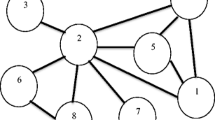Abstract
The problem of academic expert finding is concerned with finding the experts on a named research field. It has many real-world applications and has recently attracted much attention. However, the existing methods are not versatile and suitable for the special needs from academic areas where the co-authorship and the citation relation play important roles in judging researchers’ achievements. In this paper, we propose and develop a flexible data schema and a topic-sensitive co-pagerank algorithmcombined with a topic model for solving this problem. The main idea is to measure the authors’ authorities by considering topic bias based on their social networks and citation networks, and then, recommending expert candidates for the questions. To infer the association between authors and topics, we draw a probability model from the latent Dirichlet allocation (LDA) model. We further propose several techniques such as reasoning the interested topics of the query and integrating ranking metrics to order the practices. Our experiments show that the proposed strategies are all effective to improve the retrieval accuracy.
Similar content being viewed by others
References
Fang H, Zhai C. Probabilistic models for expert finding. In: Proceedings of the 29th European Conference on IR Research (ECIR’07). Rome: Springer, 2007, 418–430
Balog K, de Rijke M. Determining expert profiles (with an application to expert finding). In: Proceedings of the 20th International Joint Conference on Artificial Intelligence (IJCAI’07). Hyderabad: Professional Book Center, 2007, 2657–2662
Macdonald C, Ounis I. Voting for candidates: adapting data fusion techniques for an expert search task. In: Proceedings of the 15th ACM International Conference on Information and Knowledge Management (CIKM’06). Arlington: ACM Press, 2006, 387–396
Balog K, de Rijke M. Associating people and documents. In: Proceedings of the 30th European Conference on IR Research (ECIR’08). Glasgow: Springer, 2008, 296–308
Balog K, Azzopardi L, de Rijke M. Formal models for expert finding in enterprise corpora. In: Proceedings of the 29th Annual International ACM SIGIR Conference on Research and Development in Information Retrieval (SIGIR’06). Seattle: ACM Press, 2006, 43–50
Petkova D, Croft W B. Hierarchical language models for expert finding in enterprise corpora. International Journal on Artificial Intelligence Tools, 2008, 17(1): 5–18
McCallum A, Corrada-Emmanuel A, Wang X. Topic and role discovery in social networks. In: Proceedings of the 19th International Joint Conference on Artificial Intelligence (IJCAI’05). Ediburgh: Professional Book Center, 2005, 786–791
Serdyukov P, Hiemstra D. Modeling documents as mixtures of persons for expert finding. In: Proceedings of the 30th European Conference on IR Research (ECIR’08). Glasgow: Springer, 2008, 309–320
Liu X, Bollen J, Nelson M L, Van de Sompel H. Coauthorship networks in the digital library research community. Information Processing and Management, 2005, 41(6): 1462–1480
MacRoberts MH, MacRoberts B R. Problems of citation analysis. Scientometrics, 1996, 36(3): 435–444
Nie Z Q, Zhang Y Z, Wen J R, Ma W Y. Object-level ranking: bringing order to web objects. In: Proceedings of the 14th International Conference on World Wide Web (WWW’05). Chiba: ACM Press, 2005, 567–574
Nie Z Q, Wen J R, Ma W Y. Object-level vertical search. In: Proceedings of Third Biennial Conference on Innovative Data Systems Research (CIDR’07). Asilomar, CA, USA: Online Proceedings, 2007, 235–246
Blei D M, Ng A Y, Jordan M I. Latent dirichlet allocation. Journal of Machine Learning Research, 2003, 3(Jan.): 993–1022
Balmin A, Hristidis V, Papakonstantinou Y. ObjectRank: authoritybased keyword search in databases. In: Proceedings of the 30th International Conference on Very Large Data Bases (VLDB’04). Toronto: Morgan Kaufmann, 2004, 564–575
Brin S, Page L. The anatomy of a large-scale hypertextual web search engine. In: Proceedings of the 7th International Conference on World Wide Web (WWW’98). Brisbane: ACM Press, 1998, 107–117
Chen P, Xie H, Maslov S, Redner S. Finding scientific gems with Google’s PageRank algorithm. Journal of Informetrics, 2007, 1(1): 8–15
XiW S, Zhang B Y, Chen Z, et al. Link fusion: a unified link analysis framework for multi-type interrelated data objects. In: Proceedings of 13th International Conference on World Wide Web (WWW’04). New York: ACM Press, 2004, 319–327
Haveliwala T H. Topic-sensitive pagerank: a context-sensitive ranking algorithm for web search. IEEE Transaction on Knowledge Discovery and Engineering, 2003, 15(4): 784–796
Griffiths T L, Steyvers M. Finding scientific topics. In: Proceedings of the National Academy of Sciences, 2004, 101: 5228–5235
Giles C L, Bollacker K D, Lawrence S. Citeseer: an automatic citation indexing system. In: Proceedings of the third ACM conference on Digital Libraries (JCDL’98). Pittsburgh: ACM Press, 1998, 89–98
Zhang J, Ackerman M S, Adamic L. Expertise networks in online communities: structure and algorithms. In: Proceedings of the 16th International Conference on World Wide Web (WWW’07). Banff: ACM Press, 2007, 221–230
Veldhuis R. The centroid of the symmetrical Kullback-Leibler distance. IEEE Signal Processing Letters, 2002, 9(3): 96–99
Strohman T, Metzler D, Turtle H, Croft WB. Indri: a language modelbased search engine for complex queries. Technical report IR-407, University of Massachusett, 2005
Carrington P J, Scott J, Wasserman S, et al. Models and Methods in Social Network Analysis. New York: Cambridge University Press, 2005
Author information
Authors and Affiliations
Corresponding author
Rights and permissions
About this article
Cite this article
Wu, H., Pei, Y. & Yu, J. Detecting academic experts by topic-sensitive link analysis. Front. Comput. Sci. China 3, 445–456 (2009). https://doi.org/10.1007/s11704-009-0038-y
Received:
Accepted:
Published:
Issue Date:
DOI: https://doi.org/10.1007/s11704-009-0038-y




